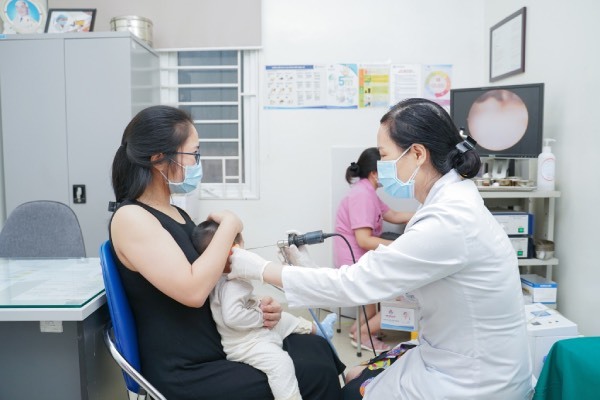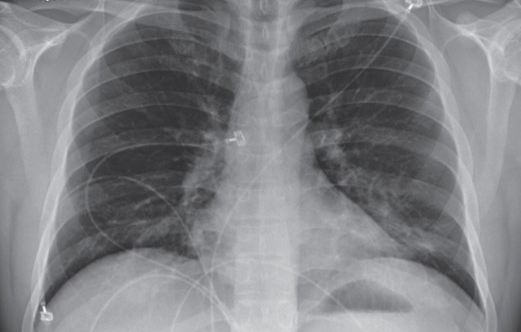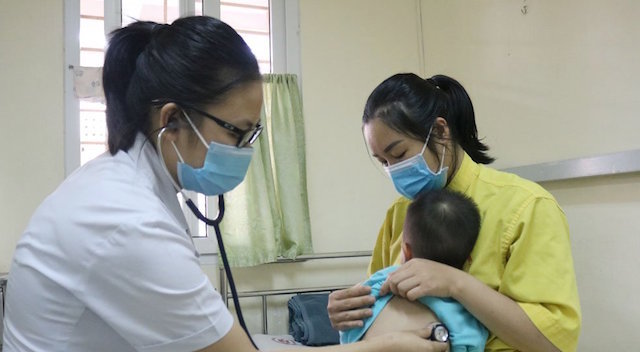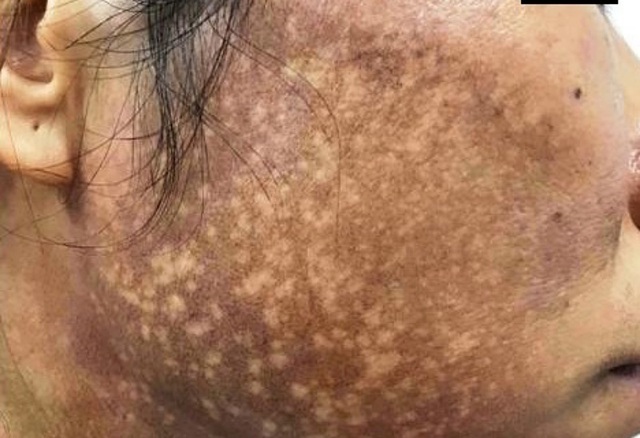Diseases stalking preschool children going back to school
When preschool children return to school after a long break from the Covid-19 epidemic, they will face many other diseases such as viral fever, chickenpox, nasopharyngitis, hand, foot and mouth disease…
Taking her child to the Pediatric Department, Bach Mai Hospital, Ms. Le Lan Huong (Hai Ba Trung, Hanoi) said that her child had been going to school for nearly 2 weeks, then she got sick twice and had to be hospitalized. Most recently, the baby had abdominal pain accompanied by vomiting. When the baby was examined, the doctor said that the baby had a digestive disorder caused by food.
Baby Nguyen Trong Luan (3 years old, Linh Dam, Hanoi) was also admitted to the hospital because of allergies, urticaria, anorexia and fatigue. The child’s mother said that when she returned to preschool, anorexia occurred, or she fell ill, so she went to school for 2 or 3 days and then missed school because of illness. When the baby’s ultrasound did not show any abnormalities, the doctor recommended that the baby have a vitamin D deficiency.
According to Associate Professor Nguyen Thi Hoai An – Director of An Viet General Hospital, with preschool children going to school will lead to many diseases such as respiratory infections, diseases related to digestion, infectious diseases.
Especially with digestive disorders, when children start school, there is a change in the living environment from home to school. Children eat and drink in class with time and menu that may be different from at home. It is a factor that puts children at risk for digestive disorders.
Common manifestations are: vomiting many times, rash on the body, lymphadenitis, sore eyes, fever. The cause of the disease is that the baby is infected with a gastrointestinal virus, but there are no signs of infection. Although the disease can go away on its own, the viral fever phase can spread quickly, causing outbreaks to become epidemics.
In addition, Associate Professor An said that some respiratory and digestive viruses, such as chickenpox virus, Japanese encephalitis, measles, enterovirus, etc., often attack and cause disease mainly in young children – subjects with immature immunity. weak, immature body, not able to resist disease.
The virus can cause a sudden high fever to 39-40 degrees Celsius or higher. During the fever phase, the children are very tired, their eyes are dull, they are less responsive to common antipyretic drugs, and are prone to dangerous seizures.
 |
| Doctor An examines a pediatric patient. |
At the time of the change of season, the virus pathogens mutate to develop, children are susceptible to viruses that cause upper respiratory infections (nasopharynx), bronchitis, infection through contact with shared toys, utensils, etc. Surfaces are not cleaned, especially in kindergarten.
Symptoms of bronchitis include: moderate or high fever, loss of appetite, cough with sputum, clear runny nose, difficulty breathing, chest pain.
Pharyngitis has two forms:
Acute pharyngitis
Symptoms of acute pharyngitis are usually dry throat, thirst, sore throat, pseudomembranous appearance in the throat and tonsils, body aches and pains. In addition, if the lymph node is inflamed, it also causes fever, headache, chills, etc.
Acute pharyngitis in children with good care will improve symptoms after a few days and completely heal after about 7-10 days.
Chronic pharyngitis
Children can develop chronic pharyngitis due to poor treatment and care of acute pharyngitis, causing long-lasting and severe damage. The pharyngeal mucosa also becomes more sensitive to pathogens, leading to repeated infections.
In addition, pneumonia parents must also be vigilant. Pneumonia is the main cause of death in children under 5 years old. The disease has manifestations such as difficulty breathing, high fever, severe cough, refusal to eat and play.
Pneumonia is a disease that progresses very quickly, especially in young children, children with weak immunity, and needs to be approached, treated and treated early.
Although they can be treated with antibiotics, with their weak immunity, they need to be taken to a medical facility for treatment and close monitoring.
In particular, when detecting that the baby has symptoms of convulsions, chest contractions, and rapid breathing, the baby must be given emergency care immediately.
Khanh Chi
at Blogtuan.info – Source: infonet.vietnamnet.vn – Read the original article here



